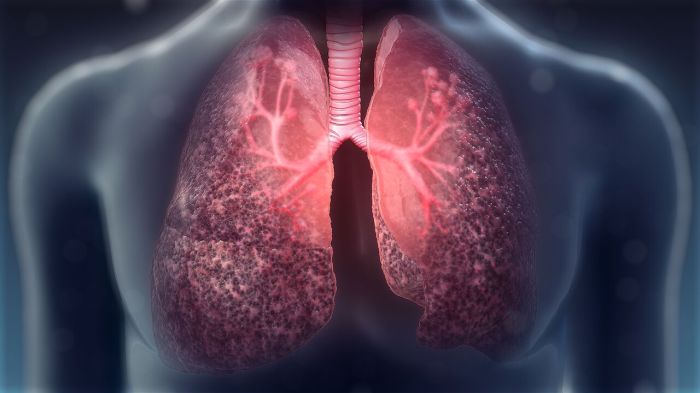Do i have cystic fibrosis quiz – Do you often cough, wheeze, or have difficulty breathing? Do you experience digestive issues like abdominal pain, constipation, or diarrhea? If so, you may wonder if you have cystic fibrosis (CF). Take our quiz to assess your symptoms and learn more about this genetic condition.
Cystic fibrosis is a chronic condition that affects the lungs, digestive system, and other organs. It is caused by a mutation in the CFTR gene, which leads to the production of thick, sticky mucus that can clog the airways and digestive tract.
While there is no cure for CF, early diagnosis and treatment can help manage symptoms and improve quality of life.
Definition of Cystic Fibrosis

Cystic fibrosis (CF) is an inherited genetic disorder that affects the cells that produce mucus, sweat, and digestive juices. It is caused by a mutation in the CFTR gene, which leads to the production of a defective protein that impairs the function of these cells.
The defective protein causes the mucus produced in the lungs, pancreas, and other organs to become thick and sticky. This can lead to a variety of symptoms, including respiratory problems, digestive problems, and infertility.
Most Common Symptoms
- Respiratory problems: These can include coughing, wheezing, shortness of breath, and frequent chest infections.
- Digestive problems: These can include diarrhea, constipation, abdominal pain, and malnutrition.
- Infertility: CF can cause infertility in both men and women.
- Other symptoms: These can include fatigue, weight loss, and delayed growth.
Symptoms of Cystic Fibrosis
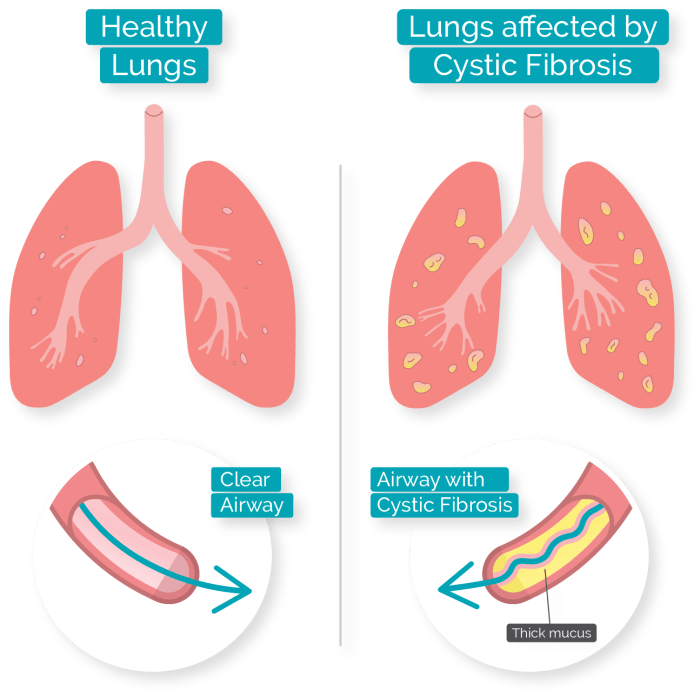
Cystic fibrosis affects various organs in the body, leading to a range of symptoms. These symptoms can vary in severity and may appear at different stages of the condition.
Respiratory Symptoms
Respiratory symptoms are common in cystic fibrosis, as the thick mucus clogs the airways. This can cause:
- Persistent coughing, especially with thick, sticky mucus
- Wheezing, a whistling sound during breathing
- Shortness of breath, especially during physical activity
- Frequent chest infections, such as bronchitis and pneumonia
Digestive Symptoms, Do i have cystic fibrosis quiz
Cystic fibrosis also affects the digestive system. The thick mucus can block the pancreatic ducts, preventing the release of enzymes that help digest food. This can lead to:
- Abdominal pain and discomfort
- Constipation due to difficulty passing stool
- Diarrhea, especially when eating fatty foods
- Malnutrition and weight loss
Other Symptoms
In addition to respiratory and digestive symptoms, cystic fibrosis can also cause:
- Fatigue and low energy levels
- Salty-tasting skin due to excessive salt loss through sweat
- Delayed growth and development
- Infertility in males
Diagnosis of Cystic Fibrosis: Do I Have Cystic Fibrosis Quiz
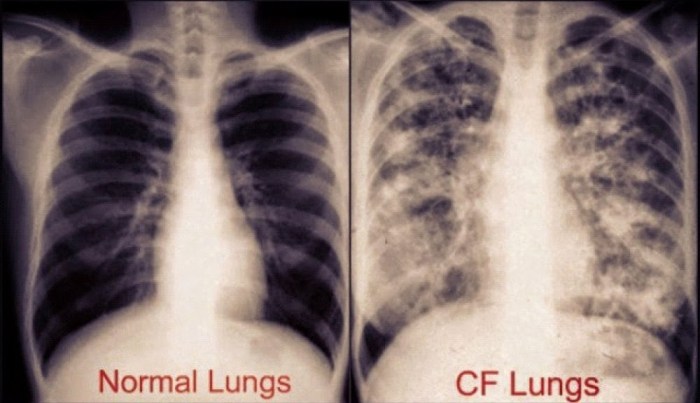
Diagnosing cystic fibrosis (CF) involves a combination of tests, including the sweat test and genetic testing.
Sweat Test
The sweat test is a non-invasive procedure that measures the amount of chloride in a person’s sweat. People with CF have higher levels of chloride in their sweat due to the defective CFTR protein. The test is typically performed on a person’s forearm and involves collecting a small sample of sweat for analysis.
Genetic Testing
Genetic testing can confirm a diagnosis of CF by identifying mutations in the CFTR gene. This test involves taking a blood sample or a cheek swab to analyze the DNA. Genetic testing can also help identify carriers of the CF gene, who do not have CF but can pass the mutated gene on to their children.
Taking the “Do I Have Cystic Fibrosis Quiz” can be an insightful step in understanding your health. While the quiz may provide some clues, it’s essential to consult a healthcare professional for an accurate diagnosis. Similarly, the blood type mystery answer key can shed light on your genetic makeup, but it’s not a substitute for medical advice.
Ultimately, the “Do I Have Cystic Fibrosis Quiz” serves as a reminder to prioritize your health and seek professional guidance when necessary.
Importance of Early Diagnosis and Intervention
Early diagnosis and intervention are crucial for managing CF effectively. Early diagnosis allows for prompt initiation of treatment, which can help prevent or delay complications, such as lung damage, malnutrition, and growth problems. Regular monitoring and treatment can help individuals with CF live longer, healthier lives.
Treatment Options for Cystic Fibrosis
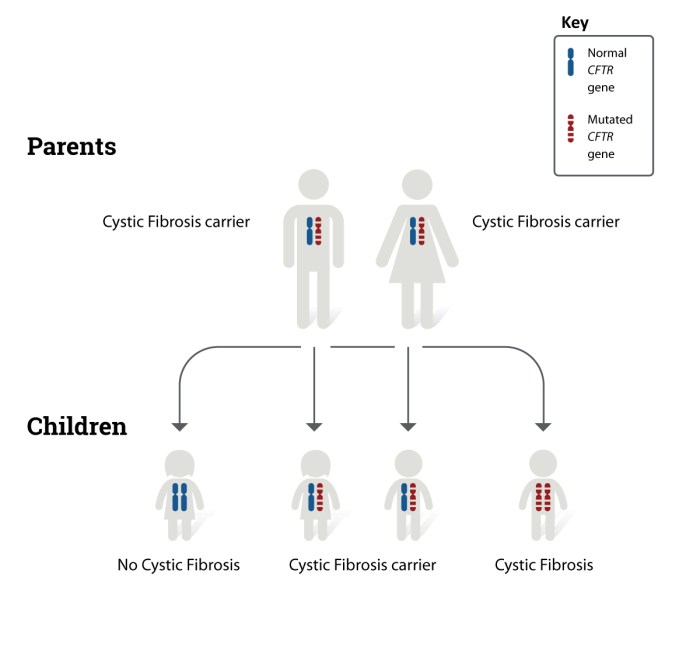
Managing cystic fibrosis involves a multifaceted approach that aims to address the various symptoms and complications associated with the condition. Treatment plans are tailored to individual needs and may include a combination of medications, airway clearance techniques, physical therapy, nutritional support, and lifestyle modifications.
Medications
Medications play a crucial role in managing the symptoms of cystic fibrosis. These include:
- Antibiotics:To combat bacterial infections that frequently affect the lungs and respiratory tract.
- Bronchodilators:To relax the muscles around the airways, making it easier to breathe.
- Mucolytics:To thin and loosen mucus, facilitating its removal from the airways.
Airway Clearance Techniques and Physical Therapy
Airway clearance techniques and physical therapy are essential for removing mucus from the lungs and improving respiratory function. These techniques include:
- Chest physiotherapy:A series of exercises and maneuvers performed by a physical therapist to help loosen and clear mucus.
- Percussion and vibration:Using a device to create vibrations on the chest, which helps loosen mucus.
- Positive expiratory pressure (PEP) therapy:Using a device that creates resistance during exhalation, which helps clear mucus.
Nutritional Support and Dietary Modifications
Cystic fibrosis can affect the absorption of nutrients, making nutritional support crucial. Dietary modifications include:
- High-calorie, high-fat diet:To compensate for increased energy expenditure and malabsorption.
- Supplements:To ensure adequate intake of vitamins, minerals, and enzymes that may be deficient due to digestive issues.
- Salt supplementation:To replace salt lost through excessive sweating.
Prognosis and Life Expectancy for Cystic Fibrosis
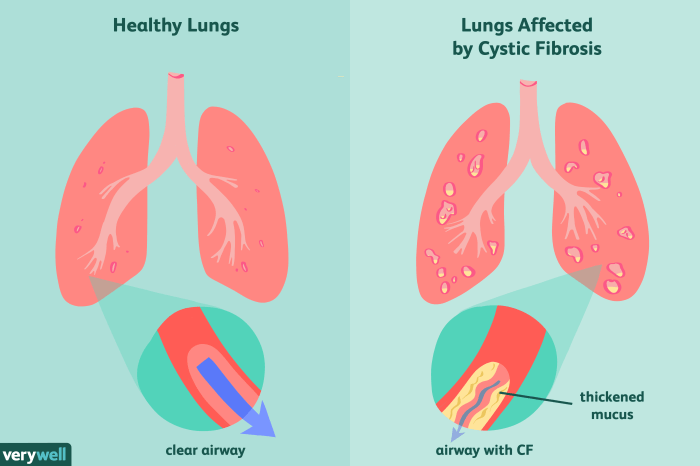
The prognosis and life expectancy for individuals with cystic fibrosis have significantly improved over the past few decades due to advancements in medical care and treatment options. However, the severity of the disease and the availability of treatment can affect the overall prognosis.
Factors Affecting Prognosis
Several factors can influence the prognosis of cystic fibrosis, including:
- Severity of the disease:The severity of the disease can vary widely, with some individuals experiencing mild symptoms and others facing more severe complications.
- Type of CFTR gene mutation:The type of CFTR gene mutation can also impact the severity of the disease and the effectiveness of treatment.
- Availability of treatment:Access to early diagnosis, specialized medical care, and effective treatments can significantly improve the prognosis and life expectancy of individuals with cystic fibrosis.
Importance of Regular Monitoring and Follow-Up Care
Regular monitoring and follow-up care are crucial for managing cystic fibrosis effectively. This includes:
- Regular check-ups:Regular appointments with a healthcare provider allow for monitoring of symptoms, lung function, and overall health.
- Medication adherence:Taking prescribed medications as directed is essential for managing symptoms and preventing complications.
- Lifestyle modifications:Making healthy lifestyle choices, such as exercising regularly and eating a nutritious diet, can improve overall well-being and slow disease progression.
Questions Often Asked
What are the common symptoms of cystic fibrosis?
Common symptoms include coughing, wheezing, shortness of breath, abdominal pain, constipation, diarrhea, fatigue, weight loss, and salty-tasting skin.
How is cystic fibrosis diagnosed?
Cystic fibrosis is diagnosed through a sweat test and genetic testing.
What are the treatment options for cystic fibrosis?
Treatment options include medications, airway clearance techniques, physical therapy, nutritional support, and dietary modifications.
What is the prognosis for cystic fibrosis?
The prognosis for cystic fibrosis has improved significantly over the years, with many individuals living full and active lives. However, the severity of the disease and the availability of treatment can affect the prognosis.
